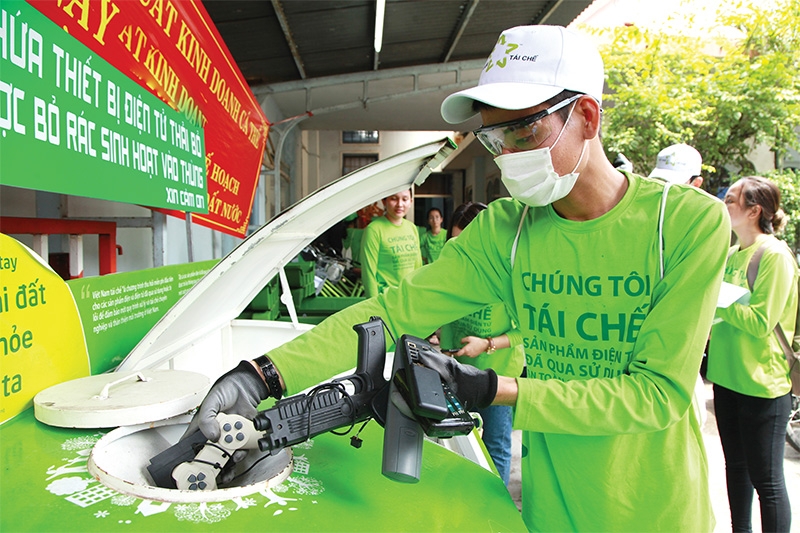Circular economy at the core of growth resurgence
 |
| Many businesses are setting targets for an increase in recycling |
In the framework of the Vietnam Corporate Sustainability Forum (VCSF 2020) themed “Sustainable development in the new decade: Turning challenges into opportunities” last week, Vu Tien Loc, chairman of the Vietnam Chamber of Commerce and Industry (VCCI) cum chairman of the Vietnam Business Council for Sustainable Development (VBCSD), emphasised the importance of the circular economy in realising the country’s three breakthrough strategies in the next 10 years. “Circular economy is the key to success and sustainable development for enterprises of all scales, from large to small and even micro-sized ones. This model contributes to energy security, dealing with climate change, promoting innovation, and improving competition capacity, thus, encouraging the business community to apply this model will be a priority for the VBCSD-VCCI,” Loc said.
The circular economy is emerging as a key approach in enterprises’ sustainable development strategies.
Speaking with VIR on the sidelines of the VCSF 2020, Do Huu Hao, deputy general manager of La Vie LLC said that the company has deployed numerous innovations in packaging, including the shift to using laser printing technology to minimise compromising the quality of plastics after recycling, as well as launching glass bottles.
“La Vie Vietnam has set the target that 20 per cent of our packaging will be recycled or re-used by 2025 and the figure will increase to 100 per cent by 2030,” Hao said.
“Along with packaging, La Vie Vietnam is also pursuing sustainable water stewardship through numerous practical activities. The company understands that protecting water resources is a responsibility of all of mankind, especially manufacturers like La Vie,” he added.
The more than 100 enterprises which were honoured at the VCSF 2020 have implemented tangible actions to shift toward the circular economy. Vietnamese businesses cannot stand aloof while the world adopts the circular economy, especially in the context of global economic integration with rising commitments on the living environment appearing in free trade agreements.
Speakers at the forum highlighted that the number of enterprises showing interest in innovation and the circular economy approach has been increasing over the past years. However, the model is still a novelty for many Vietnamese businesses, especially small- and medium-sized enterprises.
Addressing the VCSF 2020, Deputy Prime Minister Vu Duc Dam said that Vietnam has approximately 750,000 enterprises, only 2,000 of which are members of a sustainable development business community.
Dam said that although in 2020 Vietnam has risen spectacularly on the Sustainable Development Index of the United Nations Development Programme reaching 49th position from the 88th in 2016, there is a little change in the indices related to land and water. “This does not only put businesses at risk of material scarcity and price fluctuations but also affects the country’s green and sustainable growth strategy. Thus, it is necessary to build a legal framework to deal with enterprises which go against the country’s sustainability direction while supporting and honouring businesses promoting this mission,” Dam said.
At the forum, the VBCSD-VCCI called attention to the need for the National Assembly to issue a law on circular economy to encourage and spread this model. Such a law would create an ecosystem and legal framework to support companies in implementing circular economy strategies.
In addition, the council proposed building and implementing a national programme to support the business community in implementing the circular economy model for the 2021-2025 period. At first, the government can select a number of key economic sectors – such as the plastic, construction, and food industries – to pilot supporting measures and then extend the scope gradually.
“Furthermore, building a strategy to develop the circular economy in key sectors during 2021-2030 with a vision until 2050 would also be instrumental in helping this model take root at each and every enterprise across the country,” said Nguyen Quang Vinh, general secretary of the VCCI and vice chairman of the VBCSD.
What the stars mean:
★ Poor ★ ★ Promising ★★★ Good ★★★★ Very good ★★★★★ Exceptional
Themes: Towards Sustainability
- $100 million initiative launched to protect forests and boost rural incomes
- Decree opens incentives for green urban development
- European expertise to boost Vietnam’s sustainable logistics push
- Living with water: from policy to practice of the 'sponge cities' concept
- From climate pressure to new urban mindsets
Related Contents
Latest News
More News
- $100 million initiative launched to protect forests and boost rural incomes (January 30, 2026 | 15:18)
- Trung Nam-Sideros River consortium wins bid for LNG venture (January 30, 2026 | 11:16)
- Vietnam moves towards market-based fuel management with E10 rollout (January 30, 2026 | 11:10)
- Envision Energy, REE Group partner on 128MW wind projects (January 30, 2026 | 10:58)
- Vingroup consults on carbon credits for electric vehicle charging network (January 28, 2026 | 11:04)
- Bac Ai Pumped Storage Hydropower Plant to enter peak construction phase (January 27, 2026 | 08:00)
- ASEAN could scale up sustainable aviation fuel by 2050 (January 24, 2026 | 10:19)
- 64,000 hectares of sea allocated for offshore wind surveys (January 22, 2026 | 20:23)
- EVN secures financing for Quang Trach II LNG power plant (January 17, 2026 | 15:55)
- PC1 teams up with DENZAI on regional wind projects (January 16, 2026 | 21:18)

 Tag:
Tag:




















 Mobile Version
Mobile Version